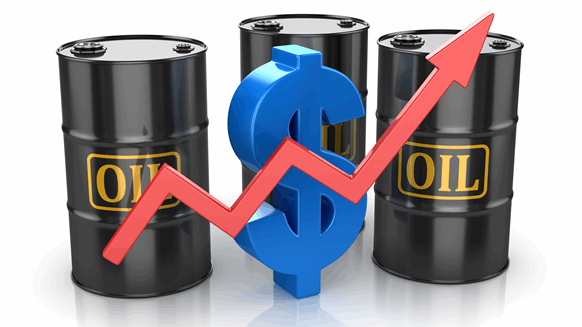Oil Surges More than 3 pct as Trade War Fears Recede


NEW YORK, April 10 (Reuters) - Oil prices surged more than 3 percent on Tuesday as investors grew more confident the United States and China would resolve their trade dispute without damaging the global economy, while Middle East tensions and a weak dollar also supported prices.
Brent crude futures jumped $2.39, or 3.5 percent, to settle at $71.04 a barrel. This was its largest single-day percentage gain since September.
In post-settlment trading, Brent hit $71.34, its highest since December 2014.
West Texas Intermediate crude futures gained 3.3 percent, or $2.09, to settle at $65.51 a barrel.
"This has been another huge day," said Bill Baruch, president of Blue Line Futures in Chicago. "There's soothing trade war fears, geopolitics, and a weaker dollar at play," Baruch said.
President Xi Jinping on Tuesday promised to open China's economy further and lower import tariffs, striking a conciliatory tone on the trade tensions between his country and the United States.
Prices of both crude benchmarks have risen more than 5 percent in the past two trading days. Both have erased their losses from last week, when concerns over a possible trade war between the two largest economies contributed to declines of more than 4 percent.
Middle East tensions also supported prices, said Phillip Streible, analyst at RJO Futures in Chicago.
"Oil markets are getting a bounce on increasing speculation about Trump and Syria," Streible said.
U.S. President Donald Trump promised a swift response to a suspected chemical attack in Syria. Such a response is likely to increase the push for the United States to exit the Iran nuclear deal, Streible said, given Iran's support of the Syrian government.
Departures from the accord would result in renewed sanctions against Iran, which would hurt its oil industry.
Also supportive to crude prices was the weakness of the U.S. dollar. The dollar fell against a basket of major currencies , hitting its lowest in nearly two weeks. Because oil is dollar-priced, a stronger greenback makes purchases in other currencies more expensive.
The American Petroleum Institute will publish its storage data later on Tuesday. Analysts anticipated a decline in crude and gasoline inventories.
The U.S. Energy Information Administration said it expected domestic crude oil production to rise by 750,000 barrels per day (bpd) to 11.44 million bpd next year, more than previously expected.
Meanwhile, Saudi Arabia's Energy Ministry said it would keep exports below 7 million bpd and restore its inventories to normal levels.
(Additional reporting by Amanda Cooper in LONDON and Henning Gloystein in SINGAPORE; Editing by David Gregorio and Will Dunham)
WHAT DO YOU THINK?
Generated by readers, the comments included herein do not reflect the views and opinions of Rigzone. All comments are subject to editorial review. Off-topic, inappropriate or insulting comments will be removed.
- Weatherford CEO's Rebound Plan Relies On Getting Smaller
- Iran Says Oil Market Is Too Tight For US Zero Exports Target
- China's Squeezed 'Teapots' Eye Petchem Path To Riches
- Baker Hughes: US Drillers Add Oil Rigs For Second Week In Three
- Venezuela Hands China More Oil Presence, But No Mention Of New Funds
- USA Regional Banks Dramatically Step Up Loans to Oil and Gas
- Oil Markets Were Already Positioned for Iran Attack
- An Already Bad Situation in the Red Sea Just Got Worse
- Valeura Makes Three Oil Discoveries Offshore Thailand
- EU Offers $900MM in Funding for Energy Infrastructure Projects
- Chile's ENAP Says Working on Decarbonization Plan
- Germany to Provide $2.3B Aid for Decarbonization of Industrial Sectors
- Mexico Presidential Frontrunner Plans to Spend Billions on RE, Gas Power
- Macquarie Strategists Warn of Large Oil Price Correction
- JPMorgan CEO Says LNG Projects Delayed Mainly for Political Reasons
- USA, Venezuela Secretly Meet in Mexico as Oil Sanctions Deadline Nears
- EIA Ups Brent Oil Price Forecast for 2024 and 2025
- Petrobras Discovers Oil in Potiguar Basin
- EIR Says Oil Demand Will Not Peak Before 2030
- Biden Plans Sweeping Effort to Block Arctic Oil Drilling
- Pantheon Upgrades Kodiak Estimates to 1.2 Billion Barrels
- Dryad Flags Red Sea 'Electronic Warfare' Alert
- Russian Oil Is Once Again Trading Far Above the G-7 Price Cap Everywhere
- Oil and Gas Executives Predict WTI Oil Price
- New China Climate Chief Says Fossil Fuels Must Keep a Role
- Chinese Mega Company Makes Another Major Oilfield Discovery
- Oil and Gas Execs Reveal Where They See Henry Hub Price Heading
- Equinor Makes Discovery in North Sea
- ExxonMobil Racks Up Discoveries in Guyana Block Eyed by Chevron
- Macquarie Strategists Warn of Large Oil Price Correction
- DOI Announces Proposal for Second GOM Offshore Wind Auction
- Standard Chartered Reiterates $94 Brent Call
- Chevron, Hess Confident Embattled Merger Will Close Mid-2024


